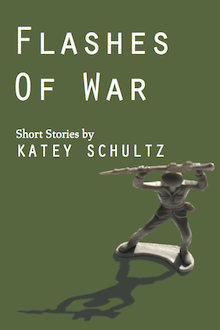Our Research Notes series invites authors to describe their research for a recent book, with “research” defined as broadly as they like. This week, Katey Schultz writes about Flashes of War (Apprentice House).
+
 In my experience, the best stories always begin with unanswered questions. Writing through the unknown toward the known has a great, humbling power over the writer. When I write short stories that require research, this simple fact keeps me honest. It also motivates me to imagine something so precisely, that, in the end, it reads as true as “real life.” In order to write Flashes of War, which features military and civilian characters in and around the wars in Iraq and Afghanistan, I had to constantly keep my imagination balanced with the hard facts of 21st Century warfare and Middle Eastern culture.
In my experience, the best stories always begin with unanswered questions. Writing through the unknown toward the known has a great, humbling power over the writer. When I write short stories that require research, this simple fact keeps me honest. It also motivates me to imagine something so precisely, that, in the end, it reads as true as “real life.” In order to write Flashes of War, which features military and civilian characters in and around the wars in Iraq and Afghanistan, I had to constantly keep my imagination balanced with the hard facts of 21st Century warfare and Middle Eastern culture.
I began writing about war in late 2009. The wars in Iraq and Afghanistan were described as “my generation’s,” but I knew very little about them and had no immediate ties to the military. I was also very unfamiliar with the Middle East and have never traveled there. Regardless — right or wrong, “their” side or “ours,” I wanted to know, on the level of basic human experience, what were these wars actually like? How did people operate under extreme conditions with less-than-ideal tools for survival? How did their personal traits influence their motivations and experiences against the backdrop of war? What were the impacts of war inside the family home or in the far reaches of an individual’s mind?
I wanted to write my way toward answers to these questions by studying the intimate moments of a soldier’s or civilian’s life — images, decisions, and thoughts so small and experienced under such strain that even an interview with the most forthcoming individual could not unearth. I was not interested in becoming an embedded reporter or detailing the facts of either war through journalism. There are many writers who have done that and done it well. As someone inclined to make sense of the world through story, I knew my window into these wars would have to be narrative. If I wanted answers to my questions, I knew I would have to study war thoroughly enough to imagine the minutia of details and experience I was most interested in…things that haven’t been recorded or documented, but are very real and believable all the same.
Inspiration for stories in Flashes of War initially came in two ways: from the rhythmic and emotional quality of a quote or from the jarring contrast of a memorable image. One example is a series of YouTube videos I watched with embedded reporter Ben Anderson. In an interview, a soldier looked into the camera and said, “America’s not at war. America’s at the mall.” I felt struck by the tension and cadence of this — the war versus the mall — and wrote my first war story titled, “While the Rest of America’s at the Mall.” Another example came from the movie Kandahar, which included a scene depicting a group of Afghan civilians, each missing a leg and using crutches. The men raced toward a plane flying overhead that dropped half a dozen prosthetic legs from its hatch, sending them down on parachutes. When I saw this, I paused the DVD. The countryside looked beautiful: rolling brown hills against a cloudless, azure sky. Then there were these legs silhouetted against the sun, these men hobbling toward them. This was a moment my mind could not comprehend, and I felt compelled to explore it by writing “Amputee” and “My Son Wanted a Notebook.”
To help immerse myself in the environment of war, I plastered my studio walls with quotes and photos. I used Google Images to “visit” Iraq and Afghanistan. In almost all cases, I was able to intersperse the stories with real locations, accurate historical or cultural references, and current facts. I read books and watched countless hours of movies until the wars found their way into my dreams. I looked up weapons, order of military rank, Arabic and Pashtun terms, colors of uniforms. The list of new phrases at my disposal seemed endless: fobbits, ripped fuel, hot brass, haji, raghead, yalla yalla, got your six, pressin’ the flesh, stay frosty. Likewise, primary accounts from civilians proved evocative: “Since my brother was killed, I cannot taste my tea. I cannot taste anything;” “I am but one fistful of dirt;” “There is no law. The gun is law.”
Eventually, I filled myself with enough information to precisely imagine my way toward fiction I could believe in. I certainly didn’t have all the answers, but I felt the stories brought me closer to something real and, if nothing else, could bear witness to the complexity of hope and suffering.
+++